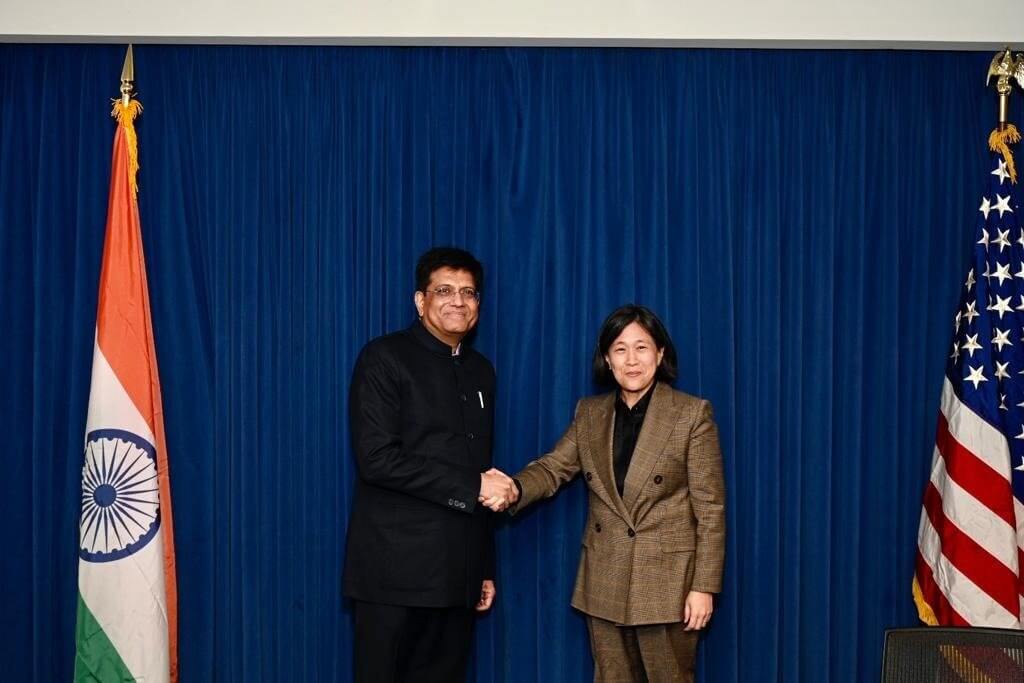Following the conclusion of the 13th India-US Trade Policy Forum (TPF) in Washington on Monday, Indian Minister of Commerce and Industry Piyush Goyal stated that New Delhi is no longer interested in a “mini” trade deal with Washington, which was being considered under the Trump administration previously.
“We are looking at much, much bigger ambitions in our trade with the US,” Goyal noted, adding that the current Biden administration is not looking forward to signing a free trade agreement (FTA) with any country, including India, owing to its “political policy.”
Held discussions to restart wild-caught shrimp exports from India to the US.
— Piyush Goyal Office (@PiyushGoyalOffc) January 11, 2023
This was an area that was banned due to concerns around turtles. A turtle excluder device designed in a collaborative effort between India & US has been taken up for trials: @PiyushGoyal
SETTLING WTO DISPUTES
Goyal revealed that a robust discussion was conducted with US Trade Representative Katherine Tai to find solutions to the many World Trade Organisation (WTO) disputes that have been plaguing both countries for several years.
“These outstanding disputes are areas where both countries have had some wins and some losses,” he remarked, adding that Indian officials had been instructed to “engage very aggressively” to pursue “some satisfactory outcomes” over the next two or three months.
India’s request for expediting the process of issuing business visas back home in India, found very good resonance with the US side. 🇮🇳🇺🇸 pic.twitter.com/kfL9k0Becd
— Piyush Goyal (@PiyushGoyal) January 12, 2023
US DELAYING INDIAN BUSINESS VISA ISSUE
The Indian minister also requested US authorities to speed up the regular business visa issuing process for people coming on short-term stays to pursue business interests, “so that trade and investment and business does not suffer.” Goyal said his request “found very good resonance.”
He further noted that the movement of professional and skilled workers, students, investors, and business travellers was “expanding,” which “helped increase our bilateral relations.”
RESTARTING INDIAN WILD SHRIMP EXPORTS TO THE US
Goyal disclosed that the two delegations discussed “restarting the wild caught shrimp exports from India to the US,” which were previously banned by the US over concerns of negative impacts on the sea turtle population in waters where the shrimps are caught in India.
In this respect, he said that a turtle excluder device has been designed with the support of the US’ National Oceanic and Atmospheric Administration, and that the device is now in trials. Goyal expressed hope that the Indian trials would be completed in the next few months, adding that Indian wild caught shrimps “[have] good acceptance in the US market, good taste, and good potential for trade between the two countries.”
RAIMONDO TO VISIT INDIA IN MARCH
Goyal confirmed that his American counterpart Gina Raimondo will be visiting India in March, along with a “high-powered delegation of global CEOs of large multinational companies,” for the next commercial dialogue and CEO Forum meeting.
During a meeting with Raimondo, the pair discussed “India’s efforts to become more self-sufficient in areas like semiconductors, defence production, and strengthening laws around quality standards.”
.@AmbassadorTai and Indian Minister of Commerce and Industry @PiyushGoyal today convened the 13th meeting of the U.S.-India Trade Policy Forum (TPF) in Washington, DC. https://t.co/qZ7lkEWYN8
— Adam Hodge (@USTRSpox) January 12, 2023
WORKING GROUP ON RESILIENT TRADE
According to a readout, Tai emphasised that the new Working Group on Resilient Trade will provide a structured framework to discuss issues related to trade facilitation, labour, environment, and good regulatory practices, with a “view towards building a more resilient future for our economies.”
The joint statement particularly focused on constructing durable and sustainable supply chains, trade contributing to environmental protection, and responding to common sustainability challenges, including the mobilisation of sustainable finance and scaling up of innovative clean technologies.
Tai further noted the “tremendous potential for growth” between the two economies, while highlighting the commitment of both President Biden and herself to “ensure that bilateral trade dialogue contributes directly to helping” both countries “respond to shared challenges in the global economy.”

